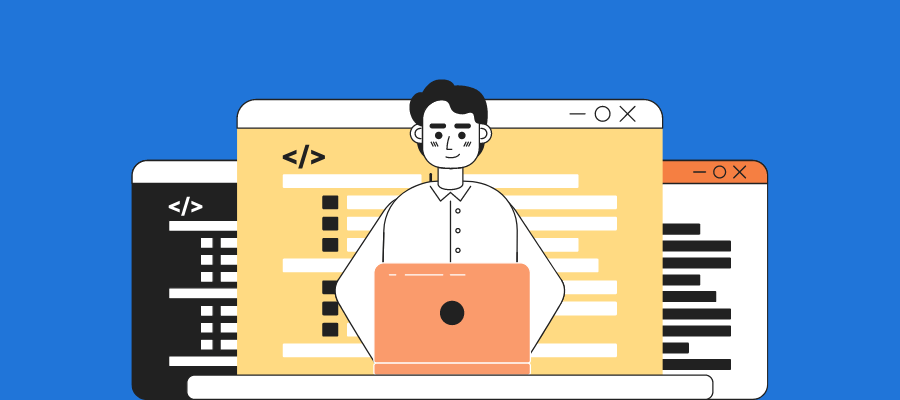Whether you’re already knee-deep in code or just getting started, this comprehensive guide will answer your questions related to software engineering career paths and roadmap in 2023.
In this guide, you will learn:
Is Software Engineering a good career path in 2023?
Yes, software engineering is a good career option because of its high demand, diverse nature, constant innovation techniques, and potential to mark meaningful societal impact.
When I searched on LinkedIn Jobs, I found that there are over 120,000+ jobs available— which shows the demand for experienced and skilled software engineers.
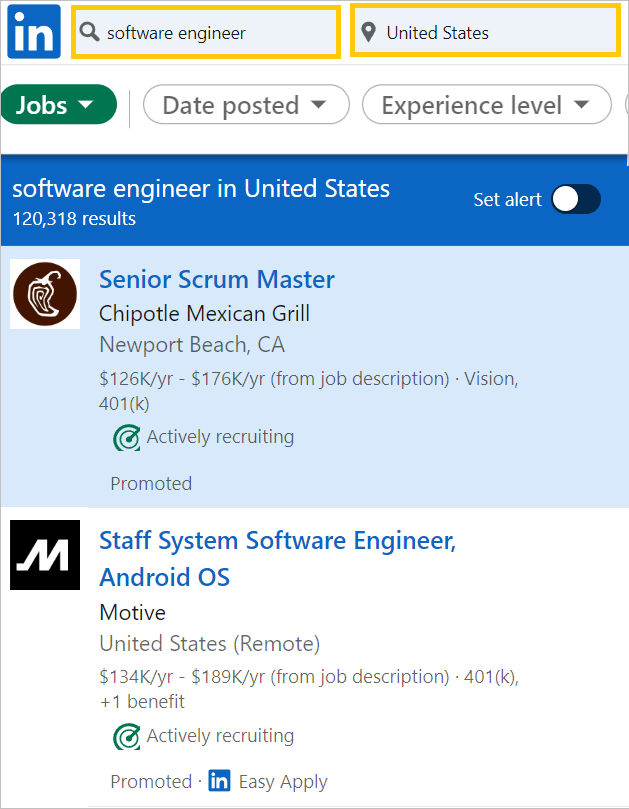
Also, Google Trends data suggests that the search demand for ‘software engineering’ has increased by around 60% in the past five years.
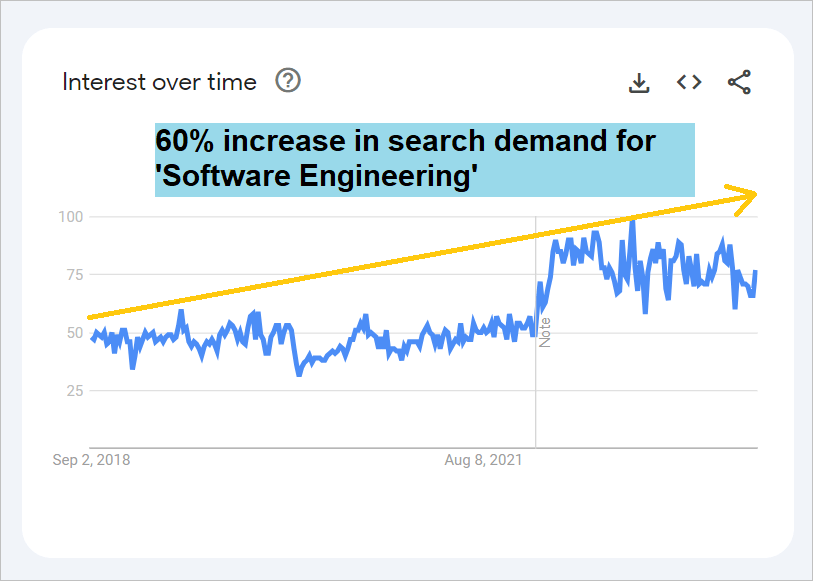
Addressing the impact of AI tools on the software engineering career, I think that repetitive tasks might be partially replaced by these tools. However, the human creativity, problem-solving, and work expertise of software engineers are not going to be replaced anytime soon.
Here’s what tech expert is saying about the software engineering career path:

Embracing Emerging Technologies
Software engineering continues to be a strong and promising career option for academic professionals in 2023. Software engineering in 2023 is not solely about routine coding tasks. It embraces cutting-edge domains like artificial intelligence, machine learning, quantum computing, and decentralized technologies.
Professionals with an academic and research background are well-equipped to navigate these frontiers, contributing to the development of novel solutions and advancing the field’s collective knowledge.
Hemanth Murali, Senior Software Engineer, Meta Platforms Inc.
What is software engineering?
Software engineering is the systematic application development process, related to scientific and engineering principles to develop, design, and maintain software systems. It implicates planning, coding, testing, and refining software to satisfy user necessities efficiently. This domain merges technological expertise with problem-solving skills to produce dedicated and inventive software solutions for a wide range of applications.
What do software engineers do?
Software engineers design, develop, and maintain software applications and systems by analyzing user requirements. They plan software architecture, write code, and perform thorough testing to guarantee the functionality and reliability of the developed application. Constant learning and adapting to developing technologies are also important for software engineers.
Day-to-Day Tasks:
- Requirement Analysis: Understand user requirements and project objectives.
- Design: Plan software architecture and interfaces as per the plan.
- Coding: Write, debug, and optimize.
- Testing: Specify and fix bugs for dependability.
- Collaboration: Coordinate with the team.
- Code Review: Ensure code quality and norms.
- Documentation: Create and maintain technical info.
- Problem Solving: Address technological challenges.
- Continuous Learning: Stay updated with tech trends.
- Deployment: Manage software rollout.
- Maintenance: Handle bugs and feedback.
- Research: Explore the latest technologies.
- Optimization: Enhance code performance.
- Meeting Deadlines: Manage project timelines.
Software Engineering Career Paths in 2023
1. Junior Software Engineer
A Junior Software Engineer designs, develops, and maintains software applications, systems, and solutions. They analyze user needs, create technical specifications, and write code using programming languages. They also debug, test, and optimize software, ensuring functionality, efficiency, and security.
Years of experience required: 0-2 years
Role Type: Entry Level or Junior Software Engineer
Average Annual Salary: ₹3,50000 lakhs in India, $89,110 in the US
Job Responsibilities:
- Help in coding, debugging, and testing software applications.
- Cooperate with senior engineers to develop and execute software solutions.
- Code reviews to assure quality and compliance with standards.
- Document code and procedures for future reference and maintenance.
- Understand and use new technologies, tools, and programming languages.
- Contribute to the comprehensive software development lifecycle.
- Run troubleshoot processes
- Address software flaws and issues
- Cooperate with cross-functional units to accomplish project goals.
- Maintain code integrity and follow designated coding prototypes.
Key Skills Required:
- Code writing, debugging, and helping in software configuration under the direction of senior engineers.
- Cooperating with the team to design, develop and test software solutions.
2. QA Engineer/Tester
Entry-level QA Engineers/Testers are responsible for assisting in software testing activities. They assist in designing test cases, conducting tests, and recording results. Cooperating with senior testers, they provide software quality, determine deficiencies, and maintain a high standard of product functionality and dependability.
Years of experience required: 0-2 years
Role Type: Entry Level Quality Assurance Engineer / Tester
Average Annual Salary: ₹800000 lakhs in India, $75,005 in the US
Job Responsibilities:
- Develop and implement test procedures and test cases.
- Cooperate with senior quality assurance engineers to ensure test coverage.
- Specify, record, and report software flaws using suitable tools.
- Validate and verify bug fixes, track improvement, and assure resolution.
- Contribute to the improvement of testing procedures and methods.
- Experience in regression testing to validate software modifications.
- Conduct experimental testing to find unexpected problems.
- Operate closely with software development units to understand software functionality.
- Maintain and edit testing documentation and processes.
Key Skills Required:
- Software testers execute testing to specify software defects, assuring the quality and functionality of developments.
- Cooperating with developers to resolve issues and enhance software quality.
3. Mid-level Software Engineer
A mid-level Software Engineer has a professional level of knowledge and expertise in planning, designing, and supporting software systems. They show concrete coding skills, contribute to architectural findings, and cooperate with cross-functional teams.
Years of experience required: 3-5 years
Role Type: Mid-Level Software Engineer
Average Annual Salary: ₹400000 lakh in India, $168,000 in the US
Job Responsibilities:
- Structure, design, and maintain complex software solutions.
- Cooperate with cross-functional teams to assemble requirements and explain technical specifications.
- Contribute to architectural decisions and system design.
- Mentor and provide suggestions to junior developers.
- Code inspections and provide code quality and compliance with standards.
- Tackle and fix complicated technical challenges.
- Optimize software implementation and scalability.
- Debug and troubleshoot software faults and issues.
- Stay updated with industry trends and new technologies.
- Assist in project planning and estimate development measures.
Key Skills Required:
- Creating and executing software solutions, collaborating with cross-functional teams, and contributing to architecture determinations.
- Mentoring junior developers and taking ownership of main modules.
4. DevOps Engineer
A DevOps Engineer blends development and IT procedures to simplify software delivery and deployment processes. They utilize automation processes, constant integration/continuous delivery (CI/CD) methods, and infrastructure management to improve cooperation. These processes will accelerate software releases with extended efficiency.
Years of experience required: 3-5 years
Role Type: Mid-Level DevOps Engineer
Average Annual Salary: ₹850000 lakhs in India, $109,545 in the US
Job Responsibilities:
- Cooperate with development units to demonstrate and apply constant integration and continuous deployment (CI/CD) pipelines.
- Automate and facilitate development, testing, and deployment strategies.
- Organize and configure cloud infrastructure and orchestration tools.
- Observe system implementation, troubleshoot problems, and guarantee reliability.
- Implement security measures and best practices for infrastructure and applications.
- Execute and handle containerization and container orchestration platforms.
- Develop and maintain documentation for infrastructure and operations.
- Cooperate with cross-functional teams to ensure seamless development and operations.
Key Skills Required:
- Automating designing, development, deployment, and monitoring procedures.
- Managing infrastructure, continuous integration, and creating delivery channels to provide smooth software development and release.
5. Front-End/Back-End Engineer
A Front-End Engineer specializes in designing user interfaces and user experiences. They are proficient in utilizing web technologies like HTML, CSS, and JavaScript to develop and optimize user interactions.
A Back-End Engineer concentrates on server-side development, handling databases, server logic, and APIs. They are able to provide the efficient functioning of applications and data processing.
Years of experience required: 3-5 years
Role Type: Mid-Level Engineer
Average Annual Salary: ₹770000 lakhs in India, $106,553 in the US
Job Responsibilities:
- Generate user-facing components and interfaces using web technologies like HTML, CSS, and JavaScript.
- Cooperate with developers to rephrase visual ideas into interactive experiences.
- Optimize applications for responsiveness, implementation, and cross-browser compatibility.
- Execute and maintain UI features, libraries, and frameworks.
- Format, design, develop, and maintain server-side logic and databases for applications.
- Design APIs for communication between the front-end and back-end designs.
Key Skills Required:
- Front-end engineers concentrate on user interfaces and user experience.
- Back-end engineers handle server-side development and data management.
- Collaborating with UI/UX designers and other sections to deliver useful and visually appealing applications.
6. Software Architect
A Software Architect is an experienced professional who develops high-level designs for complicated software systems. They create essential decisions regarding technical elements, frameworks, and configuration patterns to assure scalability, reliability, and performance. Their function involves balancing functional necessities with a long-term strategy for sustainability.
Years of experience required: 6+ years
Role Type: Senior-Level Software Architect
Average Annual Salary: ₹ 6000000 lakh in India, $144,156 in the US
Job Responsibilities:
- Cooperate with stakeholders to understand assignment necessities and constraints.
- Create the overall system architecture and high-level designs.
- Choose suitable technologies, frameworks, and design practices.
- Explain coding standards and best techniques for development teams.
- Produce technical documentation, including architecture diagrams.
- Lead discussions on technical solutions and trade-offs.
- Stay contemporized with industry trends and emerging technologies.
Key Skills Required:
- Representing high-level designs and design principles for software systems.
- Making necessary technical judgments, reckoning new technologies, and conducting architectural discussions with cross-functional teams.
7. Machine Learning Engineer
A Machine Learning Engineer is a specialist who designs and deploys machine learning prototypes and procedures. They operate with large datasets, design, and train models, fine-tune algorithms, and execute explanations for different applications such as image recognition, natural language processing, and data analysis. Their function incorporates expertise in programming, mathematics, and domain understanding.
Years of experience required: 6+ years
Role Type: Senior-Level Machine Learning Engineer
Average Annual Salary: ₹1800000 lakhs in India, $159,000 in the US
Job Responsibilities:
- Design and execute machine learning algorithms and prototypes.
- Clean, preprocess, and diagnose large datasets for training and testing.
- Select engineer features to improve model performance.
- Train, validate, and fine-tune machine learning models.
- Cooperate with cross-functional units to assemble requirements.
- Estimate and compare the performance of various algorithms.
- Monitor and sustain deployed prototypes for performance and accuracy.
- Stay updated with improvements in machine learning and AI technologies.
Key Skills Required:
- Designing and enforcing machine learning prototypes and algorithms.
- Cooperating with data scientists and domain specialists to create predictive and analytical resolutions.
Learn: What math do computer engineers use?
Job Outlook for Software Engineering
The job outlook for Software Engineering is optimistic, showing abundant opportunities in both the US and India. In the United States, there are more than 120,000 job openings on LinkedIn for experienced, fresher, and internship job roles. This shows that there are lots of opportunities for skilled tech employees.
Also, the software industry is expected to make $338 billion in 2023, and this is predicted to grow to $415 billion by 2028. In India, the software industry is also growing, and it’s expected to make $8 billion by 2023, with $3 billion coming from Enterprise Software.
Additional proof that software engineering is not dead:
From 2022 to 2030, the Compound Annual Growth Rate (CAGR) for the software engineering sector is expected to be 11.26%. This means the software engineering industry is consistently expanding, offering long-term stability and job security.
The opportunities get even better because more and more people are using software and want things to run automatically. So, if you love technology and want to make a big impact, becoming a software engineer could lead you to a successful and satisfying career.
Skills and prerequisites to become a software engineer
- Educational Foundation: A bachelor’s degree in software engineering, computer science, it, or related fields is the common entry point. Specialized roles might demand cutting-edge degrees.
- Coding Languages: Experienced in different coding languages like Java, Python, C++, or JavaScript.
- Problem-Solving: The ability to solve complicated issues into manageable elements and develop effective solutions is a core skill.
- Algorithms and Data Structures: Understanding basic algorithms and data structures is essential for developing efficient software.
- Software Development Life Cycle (SDLC): Understanding SDLC procedures such as Agile methodology, which assures seamless cooperation and high-quality outcomes.
- Version Control: Competence in various tools like Git for tracking code modifications and allowing cooperative development.
- Debugging and Troubleshooting: Recognizing and correcting coding mistakes is essential for reliable software delivery.
- Object-Oriented Design: Building universal and maintainable software using OOD principles is necessary.
- Database Proficiency: Understanding databases and SQL is essential for data-centric applications.
- Web and Back-End Development: Ability to handle various web technologies like HTML, CSS, and JavaScript with various back-end frameworks.
- Cloud Familiarity: Understanding various cloud platforms is important for contemporary software deployment.
- Personal Projects: Showcasing personal coding tasks on different platforms like GitHub highlights practical skills and dedication.
- Internships and Experience: Real-world exposure through internships, co-ops, or freelancing provides practical context.
- Certification: While not mandatory, certifications in distinct technologies can brace credibility.
The Future of software engineering— Will AI replace software engineers?
The future of software engineering will presumably affect improved collaboration between AI tools and human software creators. While AI can automate certain redundant assignments and improve productivity, it’s unlikely to fully replace software engineers.
AI tools like ChatGPT can assist in code generation and everyday tasks, but the innovative problem-solving, specialization expertise, and fine decision-making that software engineers bring to the table are irreplaceable. These tools will complete engineers by streamlining processes, but the human touch will stay crucial for innovation and complicated problem-solving in the field.
Software engineering salary
In India,
- The average software engineer’s compensation varies from 5.1 Lakhs yearly
- Entry-level engineers earn around 2.8 Lakhs yearly
- Mid-level engineers can make between 8.4 Lakhs yearly
- Senior engineers can earn up to 21.4 Lakhs yearly.
While, in the USA, Software engineers earn particularly higher wages.
- Entry-level engineers make around $108,533 annually
- Mid-level engineers can make between $139,712 per year
- Senior-level engineers with extensive experience can earn $172,330
Factors that affect the salary:
The biggest salary-affecting factor for software engineers that I have noticed is the years of work experience or expertise.
In fact, software engineers with 6-9 years of experience get paid more than 1.1.7 times the salary of software engineers with less than 1 year of experience.
Here’s the chart that showcases the relationship between the salary and work experience of software engineers

Other factors that affect the average annual salary are listed below:
- Company size and prominence
- Occupation and in-demand specific skills
- Education level and certificates
- Industry sector and market for software engineers
- Job accountabilities and leadership positions
- Ability in specific technologies or programming languages
- Performance, accomplishments, and assistance
- Negotiation skills during hiring and reviews
How Difficult is Software Engineering?
As a profession software engineering can be difficult but also rewarding on the other side too. The hardship alters based on someone’s talent, commitment, and previous knowledge. Initially, the concept might appear as difficult, but with constant practice and learning, they become more effortless.
Tackling difficult issues, like debugging complex code, can be frustrating at first but slowly evolves easier with enhanced problem-solving skills. Persistence and a growth perspective play an important role in mastering software engineering over time.
Software engineering career path Reddit— what others are saying on Reddit?
Since Reddit is a popular and favorite place for many tech enthusiasts, I checked some popular Reddit threads to understand what software engineers are saying about their career paths.
Here are some interesting thoughts I found on Reddit:
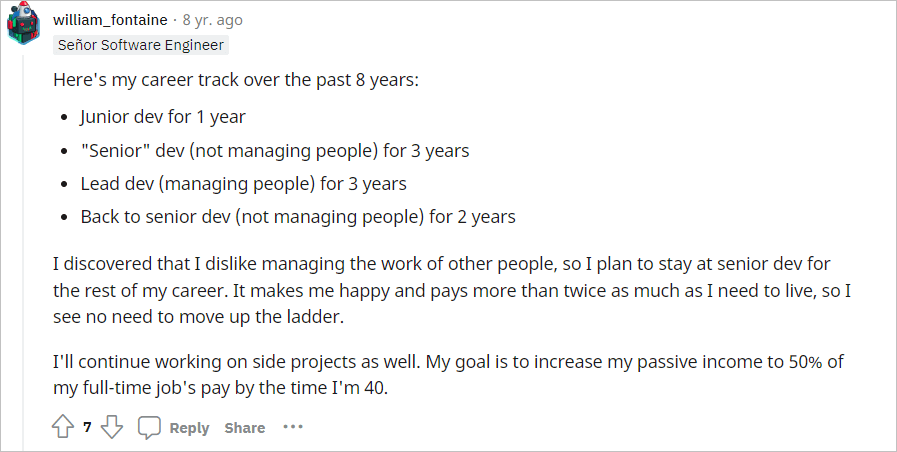
William_Fontaine followed a career path in software engineering, transitioning from a junior developer to a senior developer, then briefly into a managerial role as a lead developer before returning to a senior developer position.
He discovered that he prefers technical work and plans to remain a senior developer due to job satisfaction and higher income, with a goal of generating 50% of his full-time income from passive sources by age 40.
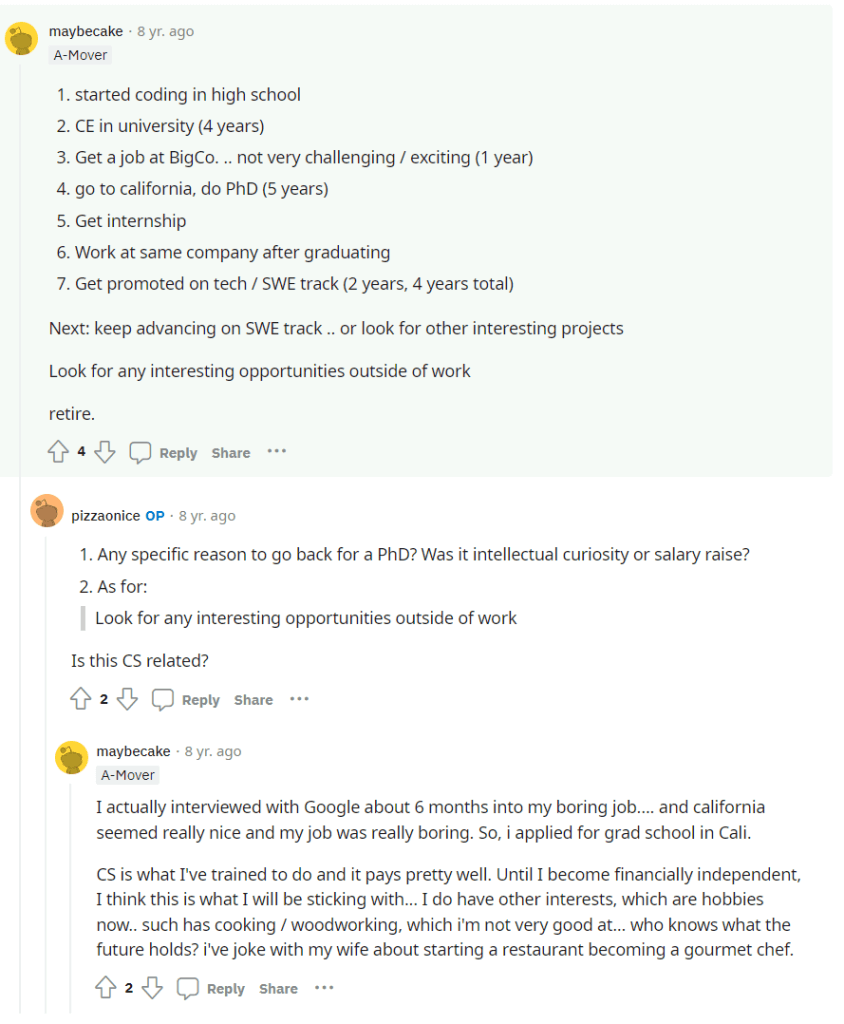
Maybeecake‘s software engineering career began in high school, followed by a computer engineering degree. After a year in a less exciting job at a large company, he pursued a PhD in California.
Afterward, he secured an internship, returned to the same company post-graduation, and achieved promotions on the technical/software engineering track, totaling four years.
Someone asked on Reddit about career possibilities for a software developer that doesn’t require coding. Here are some interesting replies I found:
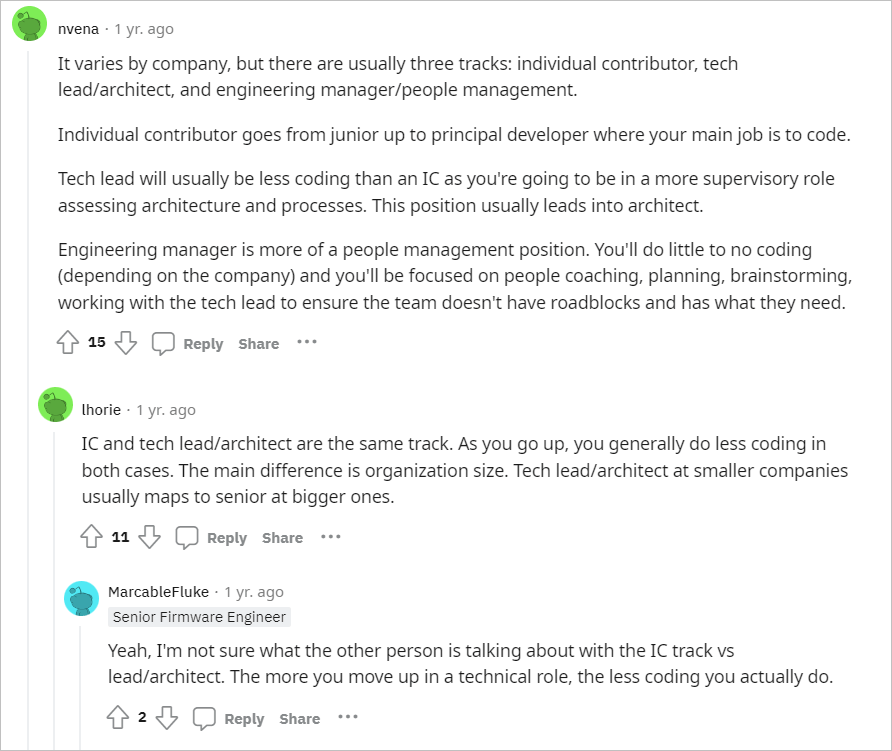
According to the comment, In software engineering, career paths typically branch into three tracks: individual contributor (coding-focused), tech lead/architect (supervisory and architectural), and engineering manager (people management).
Is the software engineering career path a right fit for you?
If you’re not sure whether a career in software engineering is the right fit for you, consider taking the below quiz and calculate your score.
Before getting started open your calculator or a pen and a paper to calculate your score.
Question 1: What excites you the most about a career in software engineering?
- Solving complex problems and puzzles (3 points).
- Creating practical and user-friendly applications (2 points).
- Collaborating with others to build software solutions (1 point).
Question 2: How do you feel about continuous learning and keeping up with evolving technologies?
- I love learning and staying current with tech trends (3 points).
- I’m willing to learn, but I prefer a stable skill set (2 points).
- I’m not interested in constant learning (1 point).
Question 3: What’s your preferred work environment?
- I enjoy working independently on projects (3 points).
- I thrive in a collaborative team setting (2 points).
- I prefer a mix of individual and teamwork (1 point).
Question 4: How do you handle problem-solving and debugging?
- I enjoy the challenge of debugging and finding solutions (3 points).
- I find it frustrating but rewarding when I solve problems (2 points).
- I get easily discouraged when facing coding issues (1 point).
Question 5: How important is work-life balance to you?
- Very important. I want a healthy balance (3 points).
- Important, but I can put in extra hours when necessary (2 points).
- Not a top priority, I can dedicate significant time to work (1 point).
Question 6: Do you enjoy mathematics and logical thinking?
- I love math and logic puzzles (3 points).
- I’m comfortable with math and logic but don’t love them (2 points).
- I struggle with math and logic (1 point).
Question 7: How do you handle stress and tight deadlines?
- I thrive under pressure and can meet tight deadlines (3 points).
- I can handle stress but prefer a more relaxed pace (2 points).
- I get stressed easily and struggle with tight deadlines (1 point).
After you answer these questions, add up your scores to get a total score.
Then, refer to the following interpretation:
7-10 points: Software engineering might not align well with your preferences and strengths.
11-17 points: Software engineering could be a reasonable fit, but consider whether aspects like continuous learning and problem-solving align with your long-term goals.
18-21 points: Software engineering appears to align with your preferences and strengths. Pursuing this career path is likely to be a rewarding choice.
I hope this will help you get a clear idea about your career preferences now.
Software engineering course certifications to start your career
If you want to start and grow your career in software engineering, these courses will help you get a high-paying job and enhance your skills.
- Introduction to Computer Science” by Harvard University (FREE): A foundational course encircling programming, algorithms, and data structures. It’s offered for free, with the opportunity to obtain a verified certification for $90.
- IBM DevOps and Software Engineering Professional Certificate (FREE): This beginner-level program, led by top instructors at IBM, equips you with practical skills used daily by software engineers. From Python to automation tools, you’ll gain hands-on experience and build a strong foundation for your future career. You’ll create applications, work with automation tools, and develop a portfolio using Agile and Scrum methodologies.
- Supervised Machine Learning: Regression and Classification (FREE): Taught by Andrew Ng, this course is highly considered for apprehending machine learning algorithms. It’s complimentary to audit, with a fee for a certificate.
- University of British Columbia: Software Engineering: Introduction: (Next batch will open soon): This course, part of the Software Development MicroMasters Program, dives into the world of designing, building, and testing complex software systems. You’ll learn crucial software engineering principles, including agile development, REST, and Async programming, software design, refactoring, and information security.
- Python for Everybody Specialization (FREE): Dive into the programming world with this beginner-level program. It covers Python, data structures, APIs, databases, data retrieval, and visualization. Learn from experts at the renowned University of Michigan.
Relevant:
- Here’s our guide on how to become a Python developer
- Python career paths

Mouri Roy is a dedicated Software Developer and an experienced Technical Content Writer with more than 2 years of experience, currently in pursuit of her B-Tech in Computer Science and Engineering at Techno Main Salt Lake.
With a strong foundation in both practical software development and the art of crafting compelling tech content, Mouri is poised to make a significant impact in the tech industry.
Mouri’s journey in the world of technology has been nothing short of inspiring. Her practical experience in Software Development spans across esteemed organizations such as VYOMOLOGY Private Limited and Hellbent, where she honed her skills in an array of cutting-edge technologies.
Her expertise includes Java, ReactJs, NodeJs, ExpressJs, MongoDB, SQL, HTML, CSS, JavaScript, and Bootstrap, making her a versatile and sought-after developer.

